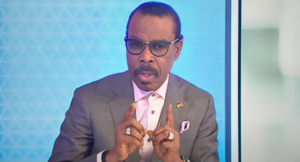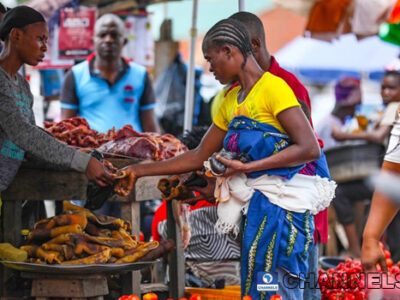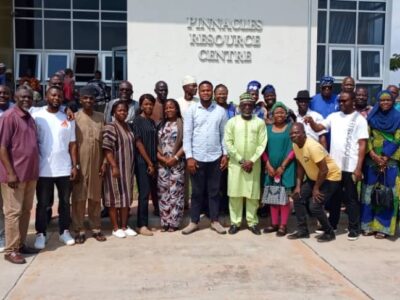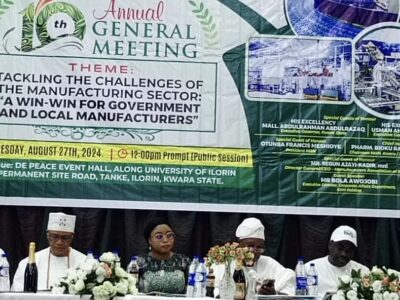Director of Financial Derivatives Company Limited, Bismarck Rewane, says the Monetary Policy Committee (MPC) of the Central Bank of Nigeria (CBN) should meet beyond four times a year to review economic and financial conditions and stem galloping inflation.
Rewane was a guest on the Business Morning segment of Channels Television’s Sunrise Daily breakfast show during the week.
Enjoy the excerpts of the interview:
Last year, Mr Cardoso had told us that the CBN Act allows them to hold at least four MPC meetings and that was fulfilled for 2023. This is 2024 and we’re beginning with February. I know that before the dates were made known we did get some jitters from investors issues of uncertainties, the rates have just been there and all of that. Does this announcement make any difference?
It surely does. First of all, let us correct something, the monetary policy committee is an independent committee which which is made up of people from the central bank and outsiders and they meet every two months to reflect on what the monetary policy is and make decisions which will affect the monetary policy in the economy high interest rates, money supply and inflation. Now, I respectfully disagree with the governor when he says the minimum number of times they have to meet is four. The minimum number of times is not the maximum number of times. Since July when the committee met last and now which is seven months, the inflation has increased by almost 5 to 6%; it’s almost 30%. So, in times like this, you have to meet more often as a matter of fact you burst all the the frontiers and meet more often to address the issues.
So, now that there’s going to be a meeting in February, I think that they will have to do the right thing. The first thing is that they will have to address what is causing inflation. Inflation is caused by so many factors: money supply, the price of diesel, exchange rate pass through… all of these things have to be addressed while at the same time ensuring that you complement the fiscal policy of the country to ensure that there’s macroeconomic stability. I think that’s the main cost. The expectations that we are going to see about anything at least 150 basis points to 200 basis points this time but the consensus, according to Bloomberg, is that for the year of 2024, we are going to see interest rates increase by about 300 to 400% in this period. That is what Bloomberg is saying after talking to economists.
Having said that, you must understand that the increasing the MPR itself is not enough, there must be a complete, the effective interest rate in the economy must increase — one to rein in money supply, and two, to stabilise the Naira. You talked a minute ago about NNPC using short-term loans and facilities from Afreximbank to stabilise the naira. In all due respect, that’s not going to solve the problem of at this point. The naira is still under pressure and it’s trading at 1,350 naira per dollar which is the the lowest point it has got to in many years; it’s a record low.
Before we even talk about some of those expectations, what about the committee of the MPC? I believe the individuals that make up the committee also determine the result of the meeting because these people will come with their experience and their perspectives and I believe Mr Cardoso is not working with the former committee. So, who should make up a committee that would be able to look at the right direction and make the right decision for forward movement for the MPC?
The Monetary Policy Committee is appointed by the President, the governor and some other recommendations; they draw them from the academia, business people with business experience and all of that, and they are confirmed by the Senate. I’m not aware that the Monetary Policy Committee that was last approved by the Senate who have a term of two years have been dissolved. So, it will be news to Nigerians to hear that the Monetary Policy Committee has been dissolved without going through a process. I suspect that we will still be using the old committee and if there’s going to be a change in committee, what time would you have to appoint them, to get the Senate to confirm them and for them to meet before February 26th. The time is too short, it looks like something that is an afterthought. So let us expect for now until we are told otherwise that the Monetary Policy Committee has approved by the Senate will remain and do their job. It’s an independent committee and their input is very necessary for macroeconomic stability.

Bismarck Rewane
Now that the governor has said that the central bank will be working with inflation target, what different does it make to conversations around the MPC and of course, the results they come out with?
Inflation targeting is a framework. What we call the Monetary Policy Framework and then you anchor expectations using what we call the nominal anchor which is the MPR and that also pulls along other interest rates in the economy so you look at money supply aggregates which is an intermediate anchor. You look at inflation itself and broken down into core food and other inflation. Then you look at the factors that are stocking inflation and then you look at all of this, you look at growth and look at unemployment and all, so that basically the monetary policy of the country actually is used to correct either when you have loose monetary conditions or when you have excess liquidity and what we call money supply saturation.
What has happened in the past seven to eight months and even before that is that we’ve seen money supply increase at about almost 39% while growth is only about 2 or 3%. So, ab initio, you have about 36% inflation factor. On top of that, we’ve seen the price of diesel which is a major stocking factor. The price of diesel has gone up to over N1,200 per litre. We’ve seen the exchange rate because the naira has dropped sharply since June when it was trading at about N800 in the parallel market; it’s now about N1,300, it lost half of its value in no time. All of these things put together means that the Monetary Policy Committee has to meet and have to deliberate and go in a granular fashion to address the issues and address them so that the price of commodities begin to actually moderate and that people begin to have purchasing power. There are so many factors that are going on at the same time including wages including government spending and expenditure. These are critical issues.
Very critical issue but another critical one is the area of energy and I think it’s about two weeks since Dangote Refineries started operations. Of course, we are all happy for that and we’re waiting with baited breath. Please help us to understand the process.
Let me correct one thing, the Dangote Refinery is commencing production and in another week or so, the products will come out in the market. There’s been initial production and everything going into the tanks but one thing is clear that there’ll be adequate supply. The last time we checked, about 33 million litres of diesel will be produced. There’s also dual-purpose kerosine. There is a question of how it is going to be evacuated to the market. 70% of the evacuation is going to come by marine vessels and about 30% by trucks that are coming in through Ogun State and Epe so it does not cause any disruption to
the Lagos traffic. Lagos traffic is bad enough with the closure of the Third Mainland Bridge.
The Dangote Refinery knowing very well that this is necessary had made adequate arrangements to ensure that they don’t compound the problems of Nigerians in terms of traffic in Lagos and the downtime to the economy.
Secondly, it guarantees supply and basically, with guaranteed supply, you will find that prices will moderate but prices are made up of cost plus the margin. So, I don’t think anybody should be fooled or get into the imagination that because the refinery is working now, prices are going to crash. You cannot sell below your marginal cost. You produce, your marginal cost equals your marginal revenue. But one thing clear is that there will be guaranteed supply and that it will also make sure that the supply goes across the country to various areas.
Also, we should bear in mind that because diesel shortages and shocks lead to inflationary pressures, once you have guaranteed supply, it will help to moderate inflation and put the economy in a good stead. The total investment in the refinery is in excess of $23 billion. That is almost 25% of the gross fixed investment of this country. The Dangote Group, I think they are the second or highest corporate payers of corporate income tax in this country. All of these things have to be put into consideration as a major milestone for Nigeria and the West African region. It’s not just a Nigerian entity; this is the single largest refinery in the world. 650,000 barrels a day. So, I think we have to put that into consideration. Having said that, we must understand that this is not a saver bullet that will solve our problems; it’s a necessary condition to moving Nigeria closer to microeconomic stability and investors of this nature like the NNPC and others should be encouraged to do more and not discouraged.
Now we have our Port Harcourt Refinery, the mechanical rehabilitation is done, at least the first phase. We have Dangote. We also hear news in states encouragement of modular refineries. Can we expect that by the end of 2024, Nigeria or Nigerians will be energy sufficient and independent.
Quite frankly, with the full commissioning of the Dangote Refinery, when all products are coming out, Nigeria will be self-sufficient and will have capacity to service the whole of Western and Central Africa, no question about about that. So, it’s not the sufficiency of products; it is just the the quantity and the quality that is produced. And right now, what we’ve been doing is that we export our oil through Trafigura Glencore, they refine it for us and bring it back. It’s a very opaque system which is not open to to transparency. Now, with this system we have, when you have excess supplies, then you’ll find out that the prices will begin to moderate and supply is guaranteed. The same thing happened in cement. There was a time when Nigeria was a major importer of cement in the 70s but because of the activities of Dangote, Lafarge, and others, we now are net exporters of cement and aggregate.
That hasn’t helped the price of cement.
Well, price is a function of cost and supply and demand. So, there’s nothing that says that once supply increases and cost does not reduce that prices will come down because people will produce at where their marginal cost equals their marginal revenue. They will not produce at any point higher or lower than that but one thing is sure that if you look at the price of a bag of cement now, maybe 5,000 to 6,000 naira and look at it five years ago, compared with inflationary trend in all other commodities, you find that cement has actually not moved as fast as it would, like other commodities because of the guaranteed supply in the country. There are other factors that goes into cement production; the cost of energy, the finances and all that but the discussion today is about how can we use refined products to stabilise logistics in this country. Don’t forget that that people have to transport goods from industry to markets and from markets across the region. So, once we get the logistics right which is one of the major factors that lead to inflation in this country, then inflation begins to moderate. If inflation moderates, the exchange rate begins to appreciate and you can see that in the last two days, maybe based on force expectation, the exchange rate moderated a little bit and I’m not sure that that is sustainable at this time. (Channels)










Comments